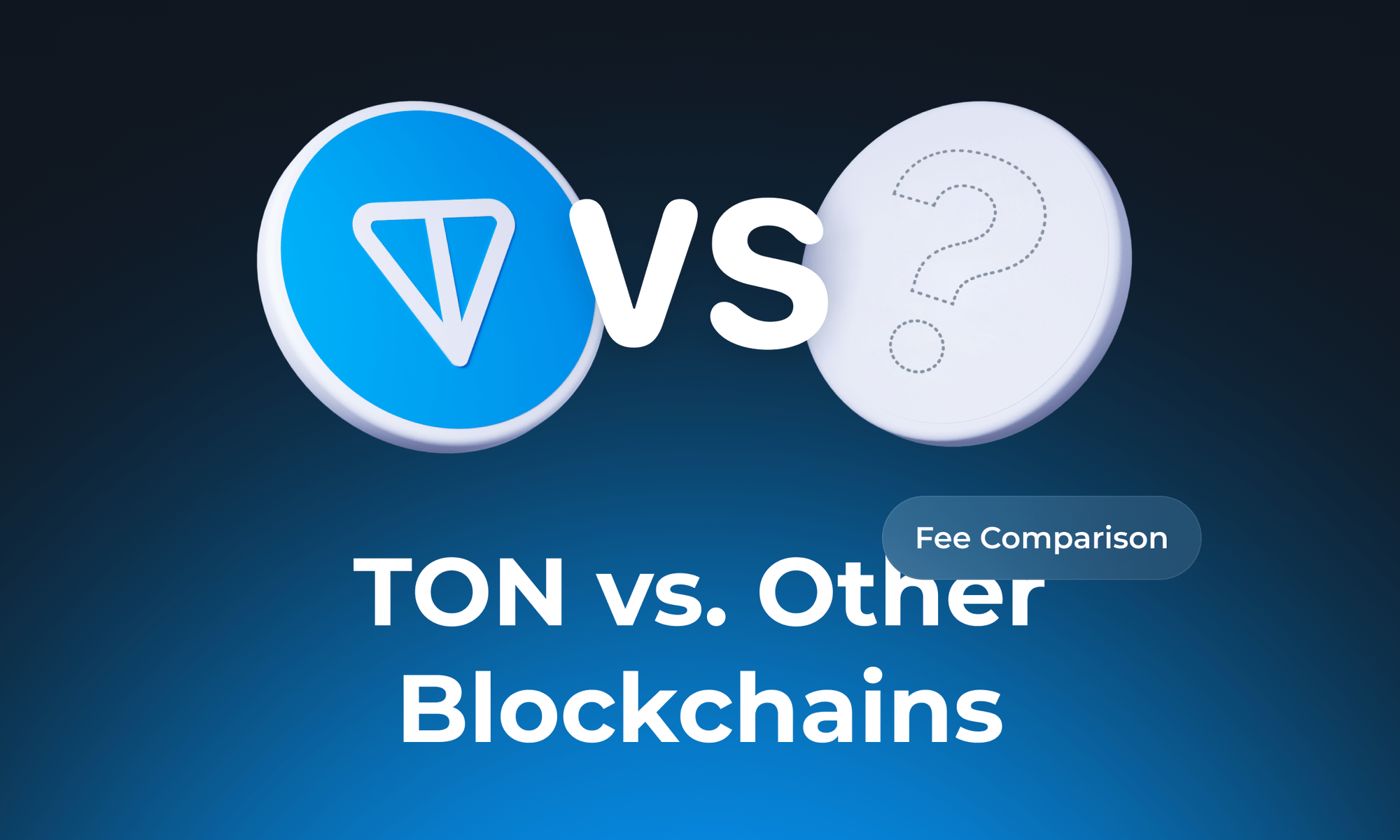TON vs. Other Blockchains: Fee Comparison

The world of blockchain technology has seen a rapid proliferation of networks, each vying for dominance in various sectors. One such network that has gained significant attention is The Open Network (TON). TON is known for its scalability, security and positioning for mass adoption. TON has established itself as a formidable competitor to well-known blockchains.
A key factor influencing user choice and network adoption is transaction fees. This article will comprehensively compare TON's transaction fees with other prominent blockchains.
Understanding Transaction Fees
A little “blockchain 101” – transactions in blockchain networks are verified by a network of computers called nodes. These verified transactions are then added to a public ledger. These nodes require computational resources to perform this task. Transaction fees compensate them for their efforts.
Several factors can influence transaction fees, including:
- Network Congestion: A network may become heavily congested with transactions. Miners may charge higher fees to prioritize their processing of these transactions.
- Gas Price: Ethereum-based blockchains use a concept called "gas". Gas represents the processing work necessary to complete a transaction. The higher the gas price, the greater the transaction fee.
- Transaction Size: Larger transactions may incur higher fees. Transactions involving more data or complex smart contracts are examples of larger transactions that may come with the higher fees.
- Network Consensus Mechanism: There are different consensus mechanisms, like Proof of Work (PoW) or Proof of Stake (PoS) on different blockchain platforms. These mechanisms can have varying impacts on transaction fees.
Fees Comparison
1. TON (The Open Network)
TON's high throughput and low fees make it well-suited for a wide variety of use cases. For example, it could be used for payment systems, supply chain management and decentralized finance (DeFi) applications. TON's architecture is designed to be scalable and resilient, while being resistant to censorship and attack. Users can be assured, it can handle a huge number of users and transactions while maintaining performance. TON offers a reliable platform for decentralized applications.
- Transaction Fee: TON's average transaction fee of 0.0055 TON is significantly lower than that of other blockchains. This makes it an attractive option for developers and users who want to avoid high transaction costs.
- Scalability: TON can handle millions of transactions per second (TPS), ensuring low fees even during peak times. TON is capable of supporting a large number of users and transactions without sacrificing performance.
2. Ethereum
Ethereum is one of the most popular blockchains, renowned for its versatility and ability to execute smart contracts. These self-executing contracts with terms directly written into code have revolutionized various industries. Ethereum's decentralized nature and security have made it a popular platform for developers. Developers use Ethereum to build dApps that offer transparency and resistance to censorship.
- Transaction Fee: Ethereum's average transaction fee is highly variable and depends on network congestion. During periods of high activity, fees can rise significantly, while during quieter times, they may be quite low.
- Scalability: Ethereum’s current transactions per second (TPS) is approximately 12.98 TPS. Meaning the network can process around 12 to 13 transactions every second. The maximum recorded TPS for Ethereum is 62.34 TPS, while the theoretical maximum is 119 TPS.
3. Solana
Solana is a blockchain platform built for decentralized applications and cryptocurrencies. Solana's architecture coupled with a unique consensus mechanism, allow it to achieve high transaction speeds and scalability. This makes it an attractive platform for developers and users seeking a fast and efficient blockchain experience.
- Transaction Fee: Solana boasts an average transaction fee of approximately $0.00025.
- Scalability: Solana can handle up to 65,000 transactions per second (TPS). This high throughput ensures low fees even during peak usage times.
4. Cardano
Cardano is a third-generation blockchain platform with a reputation for its emphasis on security, sustainability and scalability. Cardano utilizes a Proof-of-Stake consensus mechanism. Cardano significantly reduces its environmental footprint, making it a more sustainable option for blockchain technology.
- Transaction Fee: Cardano’s transaction fees are averaging between $0.11 and $0.40 per transaction.
- Scalability: Cardano can handle around 11.62 TPS, which is lower than Solana and TON.
5. Binance Smart Chain (BSC)
Binance Smart Chain (BSC) is a blockchain platform built by Binance. Binance is one of the world's largest cryptocurrency exchanges with BSC previously known as Binance Chain. Its primary purpose is to provide a scalable and cost-effective platform for developers to build decentralized applications (dApps).
- Transaction Fee: The average transaction fee on Binance Smart Chain (BSC) is approximately $0.10 per transaction
- Scalability: BSC can handle around 41.64 TPS, which is significantly lower than TON.
6. Polkadot
Polkadot is a revolutionary blockchain network that bridges the gap between isolated blockchains. It provides a framework for connecting various blockchains and enabling them to communicate and interact seamlessly. It also serves as a meta-protocol.
- Transaction Fee: An average transaction fee on Polkadot is around $0.6. This is quite a bit higher than the TON average fee.
- Scalability: Polkadot can handle only around 0.05 TPS.
Fee Comparison At-a-Glance:
Blockchain | Average Transaction Fee | Scalability (TPS) |
|---|---|---|
TON | 0.0055 TON | Millions |
Ethereum | Variable | 12.98 |
Solana | $0.00025 | 65,000 |
Cardano | $0.11 - $0.40 | 11.62 |
Binance Smart Chain | $0.10 | 41.64 |
Polkadot | $0.6 | 0.05 |
Final Words
When comparing transaction fees and scalability across blockchains, TON stands out with its attractive fees and high scalability. TON is an ideal choice for a wide range of applications, from payment systems to DeFi. By choosing a blockchain with low transaction fees, developers and users can significantly reduce costs and improve the efficiency of their applications. TON, with its minimal fees and robust performance, emerges as a leading contender in this space.